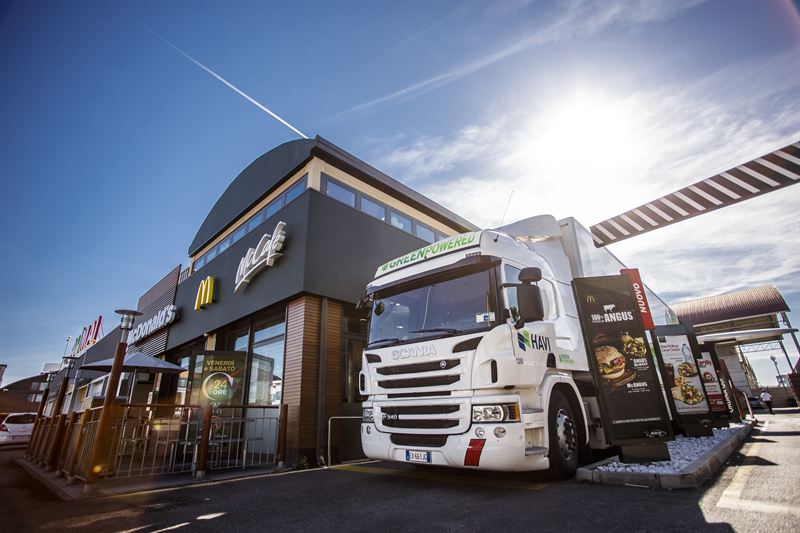HAVI and Scania help reduce CO2 emissions in McDonald’s Supply Chain

By collaborating in sustainable transport and logistics solutions, HAVI and Scania are actively addressing global climate goals. Beginning quarter three, HAVI and Scania will start to implement a five year roadmap aimed at making a significant carbon footprint reduction in transport operations to and from McDonald’s restaurants in several European countries utilizing Scania’s Next Generation trucks and operating solutions.
The aim is to significantly reduce diesel powered vehicles and shift approximately 70 percent of HAVI’s total truck fleet to alternative fuels, for example, gas and hybrid models, by 2021 within several European countries. The CO2 emissions in deliveries by HAVI to McDonald’s restaurants utilizing Scania’s next generation trucks and operating solutions will be continuously monitored in real time, bringing existing fleet connectivity to the next level. This significant transformation of the fleet is expected to lead to CO2 reductions ranging from 15 to 40 percent for every kilometre driven, depending on route, fuel and traffic conditions.
“Innovation is absolutely critical to our sustainability journey and to use our scale for good. Our work with companies like HAVI and Scania takes a proactive approach to finding and implementing more sustainable supply chain solutions, and contributes to our global supply chain and sustainability strategy.” said Chris Yong, Global Logistics Director at McDonald’s.
“Leaders in business have a responsibility to drive change. In this partnership we are setting a new standard for urban deliveries. We are not only discussing plans, but actually implementing measures here and now, to benefit the communities where we operate.” said Haluk Ilkdemirci, President, Logistics, HAVI.
“Undeniably, we see demand for sustainable transport solutions growing. This is an example of the kind of smart partnerships through which we can be more innovative and together accelerate the shift towards a sustainable transport system. ” said Henrik Henriksson, President and CEO at Scania
The gas- and hybrid trucks are designed to generate close to zero air pollution and significantly reduce carbon emissions in cities. The trucks are significantly quietier and along with the low-noise cooling equipment will help lower the impact of the deliveries made in city centres and elsewhere.
Additionally, HAVI and Scania are developing a truck with special equipment to collect waste such as used cooking oil, plastic materials and cardboard from restaurants for recycling. This will help drive increased recycling while reducing the transport of normal waste collections, reducing unnecessary additional kilometres and therefore further reduce CO2 impact.
Through this partnership HAVI and Scania are not only taking steps towards a sustainable future, but also taking action based on solutions and technologies that are available and ready to be implemented here and now for their customers, like McDonald’s.
The collaboration will initially focus on Europe while similar approaches are also being explored for Asia.
----
About HAVI
HAVI is a global, privately owned company focused on innovating, optimizing and managing the supply chains of leading brands. Offering services in supply chain management, packaging, logistics and recycling & waste, HAVI partners with companies to address challenges big and small across the supply chain, from commodity to customer. Founded in 1974, HAVI employs more than 10,000 people and serves customers in more than 100 countries. HAVI’s supply chain services are complemented by the customer engagement services offered by our affiliated company The Marketing Store. For more information, please visit HAVI.com.
About Scania
Scania is a world-leading provider of transport solutions. Together with our partners and customers we are driving the shift towards a sustainable transport system. In 2016, we delivered 73,100 trucks, 8,300 buses as well as 7,800 industrial and marine engines to our customers. Net sales totalled nearly SEK 104 billion, of which about 20 percent were services-related. Founded in 1891, Scania now operates in more than 100 countries and employs some 46,000 people. Research and development are concentrated in Sweden, with branches in Brazil and India. Production takes place in Europe, Latin America and Asia, with regional production centres in Africa, Asia and Eurasia. Scania is part of Volkswagen Truck & Bus GmbH. For more information visit www.scania.com.
For further information, please contact:
SCANIA
Karin Hallstan, Public Relations Manager, email karin.hallstan@scania.com,
phone +46 76 842 8104
HAVI
Gwendy Krijger, Vice President Communications, Logistics, email gwendy.krijger@havi.com, phone +971 56 745 8912
Scania is a part of Volkswagen Truck & Bus GmbH and one of the world’s leading manufacturers of trucks and buses for heavy transport applications. Scania is also leading provider of industrial and marine engines. Service-related products account for a growing proportion of the company’s operations, assuring Scania customers of cost-effective transport solutions and maximum uptime. Scania also offers financial services. Employing some 44,000 people, the company operates in about 100 countries. Research and development activities are concentrated in Sweden, while production takes place in Europe and South America, with facilities for global interchange of both components and complete vehicles. In 2015, net sales totalled SEK 95 billion and net income amounted to SEK 6.8 billion. Scania press releases are available on www.scania.com
Tags:


